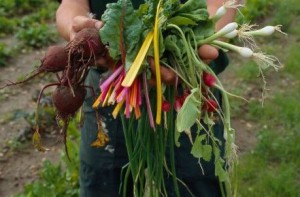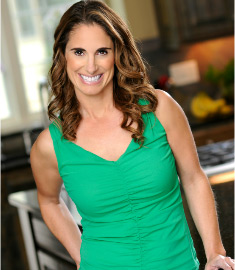 In a tight economy, sometimes even your grocery list has to feel the penny pinch. The great thing about all-essential fruits and vegetables is that you can be frugal without forgoing quality. One of the best ways to cut down your grocery costs is to start your own produce garden. Growing your own fruits and vegetables makes more than good fiscal sense—it also means you have a handful of healthy picks right at your fingertips.
In a tight economy, sometimes even your grocery list has to feel the penny pinch. The great thing about all-essential fruits and vegetables is that you can be frugal without forgoing quality. One of the best ways to cut down your grocery costs is to start your own produce garden. Growing your own fruits and vegetables makes more than good fiscal sense—it also means you have a handful of healthy picks right at your fingertips.
When you should begin planting your seeds will depend on the climate you live in. If planting in the spring, keep an eye on the weather and wait until the last of the winter frost has passed in order to ensure a healthy and strong crop. That doesn’t mean you can’t begin planting even earlier. Autumn rains will help your plants establish firm roots, so as summer begins to wind down, start preparing!
It’s not as hard as you think. With careful planning and prudent caretaking, you can grow a variety of foods from spring through fall. There are just a few things you need to get started and grow strong.
The Essentials
When selecting the space for your garden, make sure it will allow your plants at least six to eight hours of sunlight per day. High-quality soil is also a must in order for the plants to grow healthy, retain moisture and let their roots take shape. Adding compost will give soil more nutritive value. (All those leaves you rake in the fall will come in handy!) If you don’t have a backyard of your own, consider community gardening projects in open green areas, which are becoming more popular in urban cities.
Your Selection
Like any endeavor, it may take some time to get the hang of all the nuances of your own produce garden. Tending your own fruits and vegetables can become a hobby to love for a lifetime, so don’t go overboard and feel like you need to plant everything your first year. Start slow with a few choice selections. High-yield suggestions: strawberries, tomatoes, sweet peas, arugula, beets, carrots, and cucumbers. If backyard space is ample, you may also want to try planting an orchard for apples, peaches or oranges.
Tend with Care
Deciding how to handle harmful insects and pests is one of the advantages to managing your own garden versus buying in-store. Using organic products for insect control will help yield healthier crops. Regular and ample watering and fertilization will also keep your garden area clean.
The term “permaculture” is used to describe systems that imitate natural ecological relationships. You may want to try researching and grouping vegetables that grow well together, such as tomatoes and cabbages, or cucumbers and lettuce.
Enjoy the Fruits of Your Labors
Gardening is an activity that can include the whole family, so get them involved in the process. Most importantly, have fun and learn what works for you!
Want to start planting now but feel that the soon-approaching autumn won’t afford your crops enough sun? There are still lots of garden tasks that can be taken care of to get it ready for spring planting:
-Get rid of unsightly or unhealthy weeds and dead plants that are taking up useful space.
-Take time to determine how you want the crops laid out, and if you’ll need to clear away healthy but unwanted plants, patches, etc.
-Start fertilizing your soil. Remember to save those leaves you’ll be raking up come fall!
-Gather your tools—make sure your shovel, pruner, trowel, etc. are in proper working order, and if not, look for replacements.







Wonderful ideas. It is a challenge to not get overwhemed athirst with all the options. I am starting with a potted garden since I am renting. So far there are tomatoes (black, puple, cherry, and red slicing), peppers (pepperchini and serrano), basil, cucumbers, strawberry’s and of course catnip for my sweet cats. Those 7 pots are all I can fit into my schedule at the moment, but I am already dreaming of a raised beds garden in the future. Thanks for sharing. I will take your suggestion and look into what plants compliment eachither in the garden.